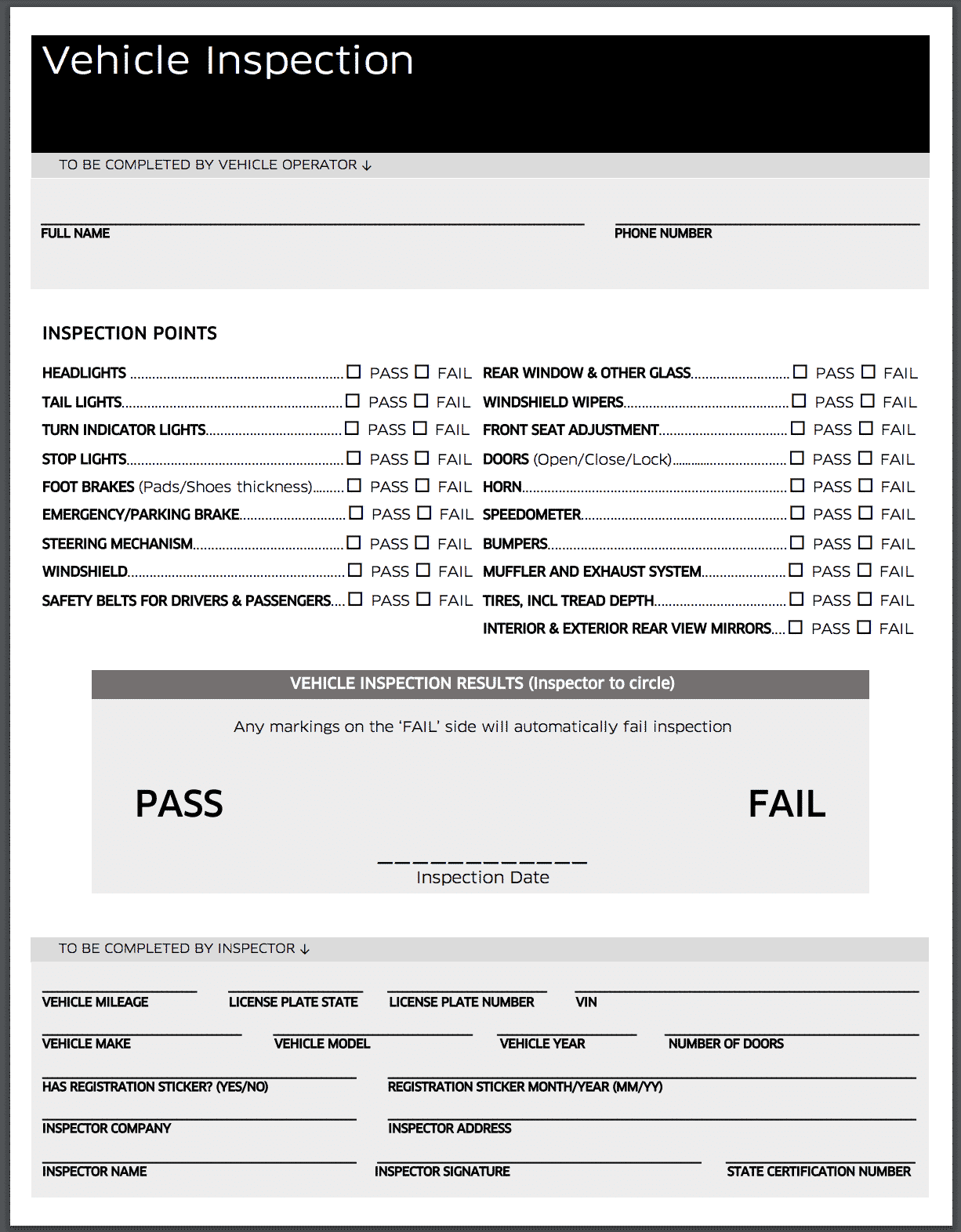Key Takeaways
- Uber requires annual inspections to ensure vehicle safety and compliance with local laws, involving a 19-point checklist.
- Inspections can be done at Uber Greenlight Hubs, approved local shops, or online via Rideshare Mechanic, with varying costs.
- Vehicles must pass all 19 inspection points, focusing on functionality and safety, like lights, brakes, and tires.
- Once inspected, complete a background check and submit necessary documents to Uber to start driving.
What Is an Uber Vehicle Inspection?
A vehicle inspection is the process that every Uber car has to go through to ensure it’s safe for passengers. The main purpose of the examination is to check the vehicle for any damage that may pose a risk on the road.
This process follows a driver’s successful background check and is essential for maintaining safety and satisfaction standards for both drivers and passengers.
Certified inspectors check the vehicle’s interior and exterior to ensure roadworthiness and passenger comfort. This ensures compliance with Uber’s standards and state laws.
An Uber vehicle inspection typically takes about 30 minutes to complete, provided there are no significant issues found during the inspection.
Brett’s Take: Thoughts From an Expert
In my experience, the Uber vehicle inspection is fairly easy to pass as long as you do a simple check yourself using the inspection form.
While there’s a bit of a grace period after getting activated as a driver, it is important to quickly take care of the vehicle inspection. Without it, you won’t be able to drive.
I personally take my car to Jiffy Lube because I don’t have an active Greenlight Hub in my city. Otherwise, I would take it there because they do them for free.
I usually do my Uber and Lyft inspection at the same time, which helps me to save both time and money.
They’re separate forms, and often two different fees, but I usually get a discount because the mechanic is doing both at once.
How Much Does an Uber Vehicle Inspection Cost?
The cost of an Uber vehicle inspection varies. If you have the inspection done at a Greenlight Hub location, it is free.
However, using third-party mechanics will incur a fee, which can vary based on the mechanic’s location and the facility you choose. Uber does not reimburse drivers for the cost of these inspections or for any repairs or maintenance required to pass the inspection.
Typically, drivers only need to undergo one inspection per year, although certain situations like accidents or expired driver’s licenses may necessitate more frequent inspections.
How Much Does it Cost to Get a Vehicle Inspection Done for Uber and Lyft Together?
The cost for vehicle inspections for both Lyft and Uber varies. While some mechanics may not charge extra for inspecting for both companies, others might require separate appointments, potentially incurring additional fees.
Rideshare Mechanic provides a virtual inspection service for both Uber and Lyft at $65, saving $15 compared to purchasing each inspection separately at $40 each.
You’ll need to download, print, and bring both companies’ specific inspection sheets to your appointment, as digital forms are not accepted and copies are not provided on-site.
Uber Inspection Form: What it Looks For
Everything the inspection analyzes is clearly outlined on a simple, one-sheet page of paper called a Uber vehicle inspection form. There are 19 points that a mechanic will consider.
This is the fame form you will use regardless ofwhether you’re using your personal vehicle or get a car specifically for Uber.

Downloadable Uber inspection form: You can find the form through Uber during the application process what the vehicle inspection form looks like.
An In-Depth Look at What the Inspection Looks For
| Headlights | Stoplights |
| Turn indicator lights | Tail lights |
| Parking/emergency brake | Foot brakes |
| Steering mechanism | Safety belts |
| Windshield | Windshield wipers |
| Muffler/Exhaust System | Front Seat |
| Tire and tread depth | Doors |
| Interior/Exterior rear-view mirrors | Speedometer |
1. Brakes
Since the Uber vehicle inspection is all about safety, it’s no surprise that a main component is a brakes-check. The inspector will verify that the brakes are functioning properly and responding as they should.
On top of that, there can’t be any signs of wear and tear or damage on the foot brake pads. This may seem like a cosmetic issue, but degraded pads can compromise the operation of the brakes.
Lastly, the emergency brake must be in perfect condition.
2. Lights
Lights are another important element when it comes to safety. That’s why certified examiners will spend a few minutes checking if they function properly.
This process will include inspecting the headlights, brake lights, taillights, and turn indicator lights. You have to make sure that they’re all in good condition.
3. Tires
There are a couple of aspects you need to keep in mind for the tire inspection. First up, you’ll have to take the pressure into account.
The tire should be at around 30 to 32 psi. Besides that, the inspector will pay close attention to the tread depth, which should be about 2/32 of an inch.
This can be a little tricky to gauge with the naked eye, but there’s an easy test that can help. All you’ll need to do is place a coin between the tread of each tire.
If you can’t see the edge of the coin, your tire should be good to go. However, if the coin is completely visible, it may be time for new wheels.
4. Seat Belts
Seat belts are a legal requirement in most states. Because of that, you should ensure that all the straps in your vehicle are in good working condition.
Look for any signs of damage on the buckles and that the locks stay in place. Plus, all the seat belts must retract smoothly into a resting position when not in use.
5. Steering Mechanism
Your steering mechanism needs to be in tip-top shape. For this, the inspector will examine several elements. These include:
- Ball joints
- Tie rods
- Bushings
- Racks
- Pinions
Sadly, there’s no quick test to verify the working condition of these components. So, it’s a good idea to have a professional mechanic check them for you.
6. Mufflers and Exhaust System
Noise can be a significant issue for many of Uber’s clients. Because of that, your mufflers need to be in excellent condition. They should be fully intact and produce minimal noise while running.
7. Miscellaneous
Aside from the other items on this list, there are a few miscellaneous aspects the inspector will need to check. These include:
- Mirrors
- Cosmetic damage
- Locking system
- Windows
- Aftermarket modifications
While this seems like an extensive checklist, the inspection process shouldn’t take too long. On average, it can last about 30 minutes based on the condition of your car.
Finally, you should note that this checklist also applies to Uber Eats drivers.
Insider Tip:
Some mechanics or body shops are banking on you to fail your inspection so that they can sell you new parts as a solution to get you on the road as soon as possible (I’m looking at you Jensen Tire).
This is a common trap, so try to go to a reputable business that just focuses on vehicle inspections, ideally an inspection business that does inspections specifically for Uber and Lyft.
Where to Get Your Vehicle Inspected
There are multiple ways to get an Uber vehicle inspection, but my favorite is at a local mechanic shop – usually Jiffy Lube.
To find a full list of locations in your area, visit the Uber Inspection Finder on Uber’s website.
1. Uber Greenlight Hub
At an Uber Greenlight Hub, inspections are free and conducted by certified inspectors familiar with Uber’s requirements.
Available in 36 cities across the US, these hubs don’t accept appointments but offer the convenience of knowing exactly what Uber looks for in a vehicle inspection.
2. Local Mechanic Shop
Uber partners with shops like Jiffy Lube and Pep Boys for inspections. Remember to bring the inspection form, as local shops don’t have it.
While you can schedule an appointment, fees vary by shop. For example, Jiffy Lube might charge around $35 for an inspection, whereas Firestone offers free checks but any necessary repairs will incur costs.
Rideshare Mechanic offers the convenience of remote inspections via video chat for a $40 fee. Appointment sign-up is required, but the process is quick and tailored to Uber’s standards, ensuring no unnecessary upsells.
Preparing for Your Inspection
To ensure you pass the Uber vehicle inspection with flying colors, you’ll need to prepare your vehicle.
First up, take the vehicle to your local mechanic for a basic maintenance checkup. The tech will be able to tell you if there are any issues with the car that may pose a hazard.
Besides that, it’s a good idea to take your vehicle in for a deep cleaning. That’s because the Uber inspector will pay close attention to how well you maintain your car’s interior.
Moving on, you’ll need to have a few documents on hand to guarantee the examination process goes smoothly. These include:
- Valid driver’s license
- Vehicle registration
- Proof of valid insurance
Plus, you should bring in an Uber inspection form for the examination. There’s a chance that designated inspection facilities will have them on hand, but better safe than sorry.
You’ll need these documents whether you’re using a vehicle rented for Uber driving or a personal car.
Post-Inspection Process
Once the inspector completes your vehicle inspection, they should be able to tell you whether you passed or failed on the spot.
In the event of a pass, all that’s left for you to do is submit your inspection form on the Uber website and wait for a confirmation reply.
However, when a driver fails the examination, the process is a little different. They’ll need to take their car to a professional mechanic who can address the issues discovered during the inspection.
Once that’s done, they can apply for a re-inspection. Thankfully, there’s no waiting period.
You can head in for a secondary examination as soon as you resolve the problem with your vehicle.
What Happens If You Fail an Uber Inspection?
If your car fails an Uber vehicle inspection, you will need to correct the identified issues before attempting the inspection again. The inspector will inform you of the specific reasons for the failure and may suggest fixes.
Utilizing a pre-approved local car repair shop can be advantageous, as you might be able to address the problem immediately or schedule a repair.
After resolving the issues, you can arrange for another inspection to get your vehicle approved for Uber driving.
Frequently Asked Questions
Can You Fake an Uber Vehicle Inspection?
Faking a car inspection for Uber is difficult because each inspection must be signed off by an Uber-approved inspector, including their name, signature, and the shop or service’s details.
The inspection form, which is state-specific and designed by Uber, is thoroughly checked by the company to detect any alterations or tampering.
Can Walmart Inspect Your Car?
No, Walmart auto care centers are not approved for Uber car inspections. Approved locations include Jiffy Lube, Firestone, PepBoys, and Midas, among other regional shops.
Check Uber’s site using their shop locator or search “Uber vehicle inspection + your city” for local options.
Wrapping Up
An Uber vehicle inspection is the examination process that every car has to go through to qualify as an Uber vehicle. It’s an integral part of Uber’s guidelines to maintain high service standards.
The examinations involve a certified inspector checking various aspects of your car. These include the brakes, lights, tires, seat belts, steering mechanism, and mufflers.
Fortunately, the inspections are free if you go through one of the Greenlight Hub locations. All you have to do is visit the Uber Vehicle Inspection Near Me page and find a certified examination center.






